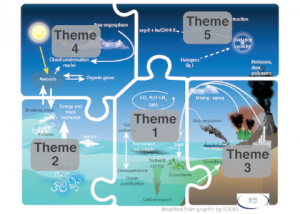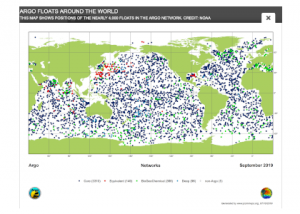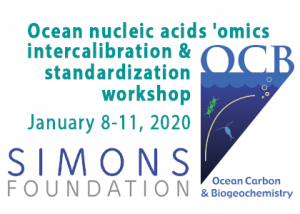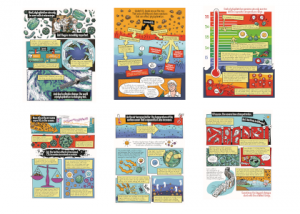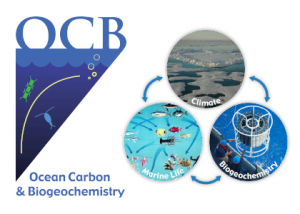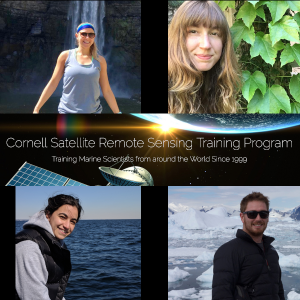With leadership from the Ocean Atmosphere Interaction Committee (OAIC), OCB convened a community workshop Ocean-Atmosphere Interactions: Scoping directions for new research October 1-3, 2019 at The Woodlands at Algonkian in Sterling, VA. The goal of this workshop was to bring together members of the U.S. air-sea research community to facilitate new collaborations and identify knowledge […]
Read MoreFour new research projects are giving a boost to NOAA’s ability to measure, track and forecast ocean acidification, warming and other important ocean health indicators. NOAA Research’s Ocean Observing and Monitoring Division has awarded $3 million in funding for projects that will expand the ability of the global Argo Program to measure ocean chemistry. Two […]
Read MoreSeptember 13-15, 2019 (C-MORE Hale Center, Honolulu, HI) Prior to OO19, the OCB Project Office planned and hosted an NSF EarthCube Workshop focused on shipboard ocean time series data. Data synthesis and modeling efforts across ocean time series represents an important and necessary step forward in broadening our view of a changing ocean and maximizing […]
Read MoreOceanObs19 Side Meeting Enhancing biological observing capacity of ocean programs and platforms – September 18, 2019 (Honolulu, HI) During the OceanObs19 Meeting, OCB planned and hosted a side meeting to bring together members of the oceanographic community to identify biological and ecological observing technology that could be deployed on current sustained observational programs. In order […]
Read MoreApplications are now being accepted to participate in the upcoming workshop: Ocean nucleic acids ‘omics intercalibration and standardization funded by the US Ocean Carbon Biogeochemistry (OCB) program. The goal of this workshop is to develop a focused marine microbial nucleic acid (na) ‘omics intercomparison and intercalibration effort to enhance future field programs that integrate methods […]
Read MoreCheck out the great new comic on phytoplankton and climate change by OCB scientist Uta Passow and comic Andy Warner. See the full panels on our Outreach & Education page.
Read MoreDuring June-August 2018, the oligotrophic North Pacific Ocean received an enormous quantity of nutrients in the form of molten lava, delivered by the erupting Kilauea on the big island of Hawaii. A phytoplankton bloom formed in response to the input of lava and an expedition was rapidly mobilized to determine its composition and the relevant […]
Read MoreBy Simon Clegg and Matthew Humphreys (UEA) Members of a funded NERC/NSF project A Thermodynamic Chemical Speciation Model for the Oceans, Seas, and Estuaries are working to develop new tools for the calculation of chemical speciation in seawater and other natural waters. After seeking feedback from the oceanographic community via a Town Hall at the […]
Read MoreThis workshop took place at the National Oceanography Centre, in Southampton, UK from 22-26 July, bringing together 75 researchers from 8 countries. The aim of the BIARRITZ (Bridging International Activity and Related Research Into the Twilight Zone) project is to act as a forum for the growing number of projects investigating the functioning of the […]
Read MoreDownload Workshop Report (PDF) Jump to Venue and dates Overview Agenda Participants Organizers Relevant resources Venue and Dates Venue: C-MORE Hale Center at the University of Hawai’i Mānoa campus (PDF map), 1950 East West Road, Honolulu The workshop commenced first thing in the morning on Friday, September 13 and ended at lunchtime on Sunday, September […]
Read MoreThe Ocean Carbon and Biogeochemistry (OCB) Program is soliciting proposals for OCB activities that will take place or begin during the 2020 calendar year. We seek proposals for OCB-relevant workshops and activities as follows: Scoping workshops (~50-70 people) that bring together an appropriate body of expertise to foster discussions and develop forward momentum in a […]
Read MoreSummary This workshop, held March 4-5, 2019 at Rutgers University, was attended by 14 researchers from 11 different institutions. The workshop focused on synthesizing the existing research on fish carbon flux, discussing challenges in measuring fish carbon flux, and determining approaches for estimating fish contribution to carbon flux on variable scales. Presentations interspersed with group […]
Read MoreThe first of two OCB-funded meetings was held in Woods Hole, MA, June 22-23 by a team of researchers working on identifying the largest remaining challenges for internal consistency of the carbonate system in seawater. Discussion primarily focused on disagreements between measured and calculated seawater pH and on proposing efforts aimed at identifying the […]
Read MoreThe Cornell Satellite Remote Sensing course took place June 3 – 14 in Ithaca, NY. The goal of the course was to teach participants the basic skills needed to work independently to acquire, analyze and visualize data sets derived from a variety of satellite sensors. The course also covered image analysis methods to work with […]
Read MoreOCIM Workshop ReportThis workshop, held June 23, 2019 at Woods Hole Oceanographic Institution, was attended by 22 researchers from 18 different institutions. This tutorial-based workshop focused on teaching participants to use the Ocean Circulation Inverse Model (OCIM) for biogeochemical modeling. Participants were introduced to the basics of transport matrix calculations using MATLAB, and learned to […]
Read More

